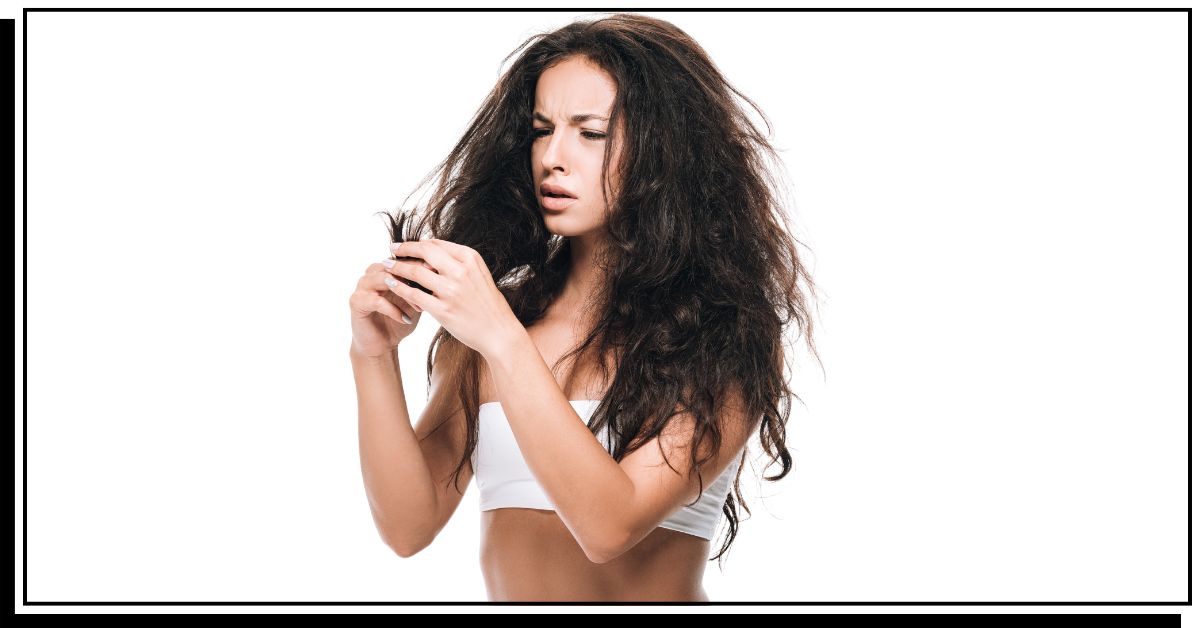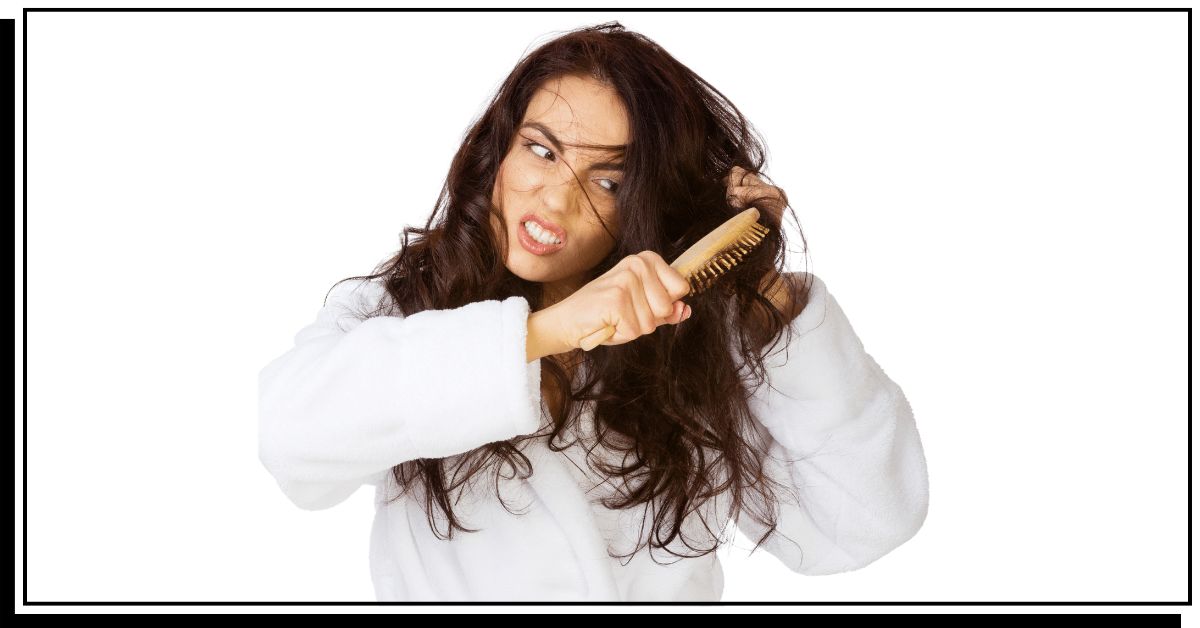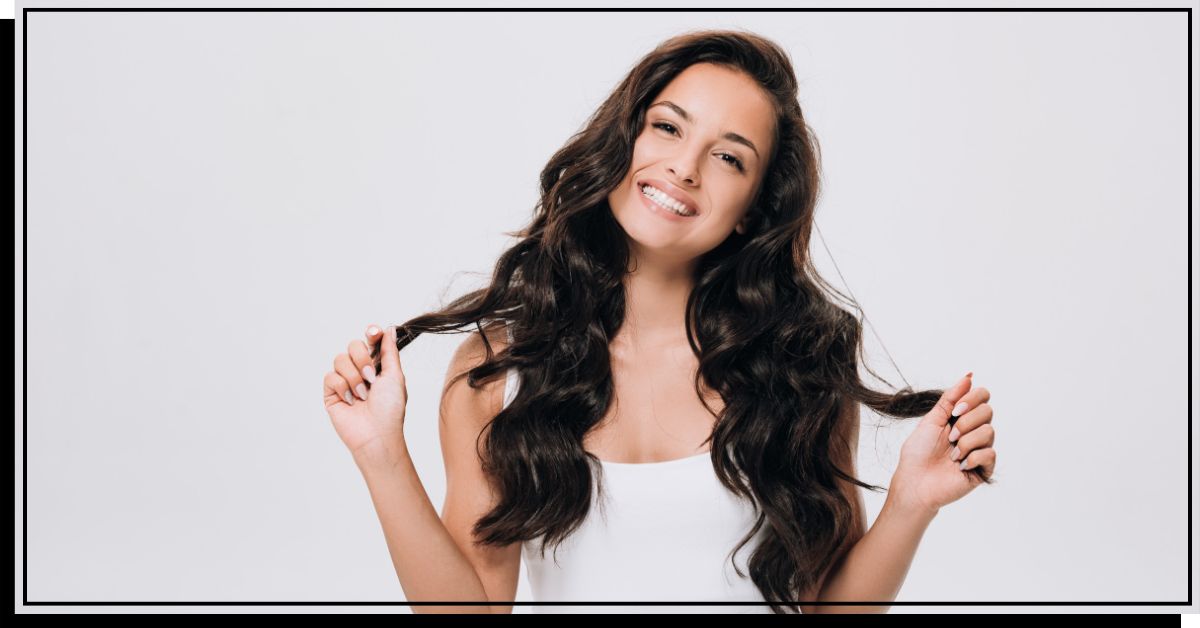Hi Cindy, I’ve been wrestling with a hair dilemma that’s driving me up the wall. No matter what I do, my hair has this persistent straw-like texture that’s neither here nor there. I don’t use a ton of styling products, and I’m pretty regular with trims. What might be causing this and what I can do to bring back the softness?
Janice Fisher
Bakersfield, CA
Hi Janice,
Loss of moisture in the hair is the most common reason hair can feel like straw. The loss of moisture can depend upon several factors, from improper hair care to environmental issues.
Straw-like hair is more than just dull and prone to breakage. It’s also unattractive and tough to style. I asked Jillian Allen, hairstylist, at Bespoke Salon in Phoenix, AZ, which people are most affected by this issue.
She told me, “Fragile and dry hair can affect men and women of any age but generally occurs more often as you age. In general, it’s important to talk to a doctor if you notice sudden changes in your hair health, as it could indicate an internal imbalance.”
Luckily, several ways to fix dry, brittle hair don’t require a prescription. In this article, you’ll learn:
- What causes hair to feel like straw 👇
I’ll discuss improper shampooing, chemical treatments, environmental factors, and other possible culprits.- Why your hair feels like straw 👇
Your hair might feel like straw for one or several reasons. I’ll share how to narrow down what’s affecting your hair.- How to fix dry, straw–like hair 👇
Use a hydrating non-sulfate shampoo, regularly deep condition, and eat a healthy diet. You’ll find detailed instructions for every tip provided.- Frequently asked questions about this problem 👇
Wondering how to keep your hair soft after showering? Or maybe why your hair feels like straw during pregnancy? You’ll find answers to all your questions.
What Causes Hair to Feel Like Straw?

Straw-like hair doesn’t have a single universal cause. Dozens of factors can contribute to that dry, rough feeling.
Excessive heat styling, improper wash routines, and chemical treatments are common culprits. Internal factors like stress and lack of nutrition can play a role, too. (source).
Even your environment can take a toll on your hair, leaving it dull and straw-like. Extreme heat, overexposure to the sun, low humidity, and cold winds can all affect the texture of your hair.
I asked Jillian about other potential causes, especially if your hair isn’t chemically treated.
She says, “There are many reasons natural hair might feel dry and brittle. Most often, excessive use of hot tools without proper heat protection causes hair to become dry and damaged.
However, dry and brittle hair can also be a symptom of a thyroid problem. Your hormones regulate the rate at which your cells work – including your hair follicles. When there is an imbalance, your hair can become finer and more fragile.
New medications, steroids, or anesthesia can also cause changes in your hair texture.”
Science and hairdressers agree that quite a wide range of factors can cause straw-like hair.
Why Does My Hair Feel Like Straw?

Straw-like hair is usually a sign of dehydrated hair. Here are some of the most significant factors that contribute to your hair feeling dry, rough, and brittle:
1. You Use Excessive Heat to Style
Overuse of heat styling tools like hair straighteners, curling irons, and blow dryers is a significant cause of straw-like hair.
Excessive heat can strip the hair of its natural moisture, leading to dry, brittle hair over time. It can also cause split ends, creating a straw-like texture to hair (source).
When using heat to style hair, always use a heat-protective styling spray or gel to keep breakage at bay. Also, turn the heat down a notch so it won’t burn off your hair’s oils and proteins.
2. Your Home Has Hard Water
Believe it or not, your home’s water quality can significantly affect your hair’s texture. Hard water leaves your hair fragile and straw-like. Soft water helps your hair look and feel softer, shinier, and healthier.
If your hair feels like straw, no matter what changes you make, it’s worth checking your home’s water quality.
The minerals in hard water can cause hair to become dry, frizzy, and difficult to manage. Calcium build-up can form around the base of hair follicles. This causes your hair strands to break, which can hinder the natural growth of new hair (source).
Washing your hair in soft water keeps it soft, shiny, and manageable. It doesn’t leave mineral build-up or harmful residues that’ll dry out the hair or cause an itchy scalp.
Soft water also lathers faster and easier during hair washing. You don’t have to use as much product as you do with hard water. This, in turn, limits the amount of dandruff produced by your scalp.
3. You Spend a Lot of Time Swimming Outdoors or in Pools
If you spend a lot of time swimming outdoors or in pools, the chlorine in the water can dry your hair out. Chlorine can strip off the natural oils from your hair, causing it to appear brittle and straw-like. It also weakens your hair, resulting in split ends (source).
Keep your head above water while swimming to prevent chlorine from damaging your hair. You can also use a swimming cap to protect your hair from the chlorine’s damaging effects.
Once you’ve finished swimming, rinse your hair immediately. You’ll also need to wash it with a specially formulated swimmers’ shampoo and deep conditioner.
My personal favorite is the Swimmers Wellness Collection by Malibu. This kit includes a shampoo for removing chlorine, a deep conditioner, and an intensive treatment for heavy chlorine build-up. Best of all, this brand is kid-safe, 100% vegan, and cruelty-free.
4. You Get Regular Chemical Treatments
Chemical hair treatments significantly alter your natural balance of hair oils. Services like rebonding, perming, Keratin, bleaching and dying can all lead to dry, brittle hair.
These chemical applications can dissolve the protective cuticle layer on each strand of your hair. This can also lead to follicle damage and, in severe cases, scalp issues or hair loss.
Pay special attention to your locks after any chemical treatment. Without this extra care, you’ll be stuck battling straw-like hair daily.
5. Your Nutritional Intake is Off-Balance
If you’re not getting enough nutrients from your food, you might see the effects on your hair.
Essential fatty acids, vitamins, and protein play a crucial role in the health of your hair. Nutritional deficiencies can lead to dry, brittle hair and hair loss.
Here are some of the best foods that promote healthy hair growth (source):
- Fatty fish (omega-3 fatty acids)
- Eggs (protein)
- Spinach (vitamin A)
- Berries (vitamin C)
- Avocados (vitamin E)
- Sweet potatoes (vitamin A)
- Nuts (vitamins E and B, zinc, and essential fatty acids)
- Oysters (zinc)
- Beans (zinc, iron, and biotin)
6. You Brush or Comb Aggressively
Aggressive brushing can damage your tresses. Over time, you’ll deal with uneven oil distribution, breakage, and split ends. Being too rough can even cause mechanical stress on your hair, which increases the amount of hair shed in a day.
If your hair routine asks for 100 brush strokes daily, you might want to rethink that strategy.
Brushing your hair that much can weaken your locks by adding friction, ultimately resulting in hair loss.
Don’t overbrush! Put down the brush as soon as your hair feels soft and tangle-free.
When combing or brushing your hair, start at the ends. Don’t force the brush through your hair if you’re met with tangles. Instead, use your fingers to loosen any knots gently. You can also add a hair detangler or leave-in conditioner to give it more slip before proceeding.
Once the tangles are removed from the ends of your hair, move up a few inches and brush down again. Don’t rush—be gentle with your hair! Repeat until you get to your scalp and have completely detangled your hair.
How to Fix Dry, Straw-Like Hair

Now that you know the likely cause of your dry hair, you can take steps to fix it. I asked Jillian for her top recommendations. She said, “There are a few things you can try at home before seeking advice from a physician.
Firstly, use a professional strengthening shampoo and conditioner, such as Olaplex or The Kure by Amika, and avoid washing your hair too often.
Secondly, incorporate a treatment once a week, such as K18. Next, minimize your use of hot tools as much as possible, and be sure to use a heat protectant if you need to use any hot tools.
If you incorporate all of these tips and your hair has not improved after two months, that may signal the problem is hormonal.”
Give Your Hair Some TLC
Your hair needs as much care as any other body part. Giving it a bit of TLC can significantly improve the appearance of your hair.
Taking care of your hair is more than cleansing, conditioning, and styling. It also includes other care practices such as being gentle whenever you brush/comb, constantly washing your hair after swimming, and ensuring you have a balanced vitamin intake.
To fix straw-like hair, follow these TLC hair tips:
- Don’t over-wash your hair, as doing so can strip it out of its natural oils. For dry hair, washing 1 to 2 times a week is more than enough.
- Use a sulfate-free shampoo to help your scalp with moisture retention. Sulfates strip away too much moisture from the hair, leaving it dry, brittle, and damaged. They can also make the scalp flaky and irritated (source).
- Eat a healthy diet. Consume foods that support healthy hair growth– particularly those with vitamin D, B12, biotin, iron, and zinc.
- Don’t brush or style your hair while wet, making it more susceptible to breakage. It can also lead to frizz when your hair dries. Wait until your hair is mostly or at least partially dry before brushing.
- Regularly deep condition to add softness, shine, and moisture to your hair. If your hair is severely damaged or dry, deep condition once a week. Otherwise, deep conditioning two to three times a month is sufficient.
- Trim your split ends as they make your hair look thin and frail.
- Sleep on a silk pillowcase to reduce tangles and frizz.
- Wrap your hair in satin and silk wraps when going to bed. Satin and silk help prevent frizz, unnecessary breakage, and loss of moisture.
- Use a microfiber towel when drying hair. If possible, wrap your hair in the microfiber towel for 10 to 15 minutes instead of aggressively rubbing the dampness out of your hair.
- If you’re planning to be in the sun for a while, use a UV-protectant spray or a hat to protect your hair from UV damage.
- Brush from the ends up to prevent tangles and damage.
Take Preventative Action
Preventative action must be taken to reduce the appearance of straw-like hair.
Always use a gentle and nourishing shampoo to eliminate the dirt and grime your hair has accumulated over the day. Then, apply a high-quality leave-in to protect, restore shine, and enhance your hair’s natural beauty.
I recommend It’s a 10 Haircare Miracle Leave-In Plus Keratin. Not only does it strengthen and detangle hair – it also helps reduce frizz, infuses your locks with moisture, and replaces lost protein.
Speaking of lost protein, don’t overuse heat-styling tools. Limit your blow dry, flat iron, and curling iron usage to once or twice a week if you can, and reserve heat-styling for special occasions.
Use heat-protective products like Oribe Balm D’Or Heat Styling Shield to protect your hair from thermal damage. In addition to offering heat protection, this product helps restore strength to your hair while fighting frizz and flyaways.
Consult With Your Doctor
If you’ve tried all the care tips above and saw no results, it might be best to consult your doctor. Health-related factors, like alopecia, hirsutism, anorexia nervosa, autoimmune thyroid diseases, and the like, might cause the straw-like nature of your hair.
A medical professional can find the cause of your dry, brittle hair. They’ll also provide you with the proper medication to combat the issue.
Frequently Asked Questions
How do I keep my hair soft after showering?
To enhance the softness of your hair after showering, try adding a good-quality leave-in conditioner. It’s A 10 Miracle Leave-in Plus Keratin is my all-time fave– it’s jam-packed with the nutrients and moisture your hair needs, but it won’t weigh you down or make your hair look greasy.
Are you not looking to add a new product to your routine? Dry your hair using a microfiber towel and let air dry to improve softness.
Why is my hair suddenly like straw?
A drastic change in your lifestyle often causes the sudden onset of straw-like hair.
Moving to or visiting a new area, changing your diet, and starting or stopping medication are all likely culprits.
What foods help dry, brittle hair?
To combat dry, brittle hair, eat foods that are rich in:
- B-Vitamins (B6 and B12)
- Iron
- Biotin
- Zinc
- Vitamins A, C, and D3,
- Omega 3s
- Protein
Such foods include leafy greens, citrus fruits, fish, eggs, nuts, and lean meats.
Why does my hair feel like straw after bleaching?
Bleach strips away your hair’s natural oils, leaving it dry, brittle, and straw-like. It’s a harsh invader that breaks your hair protein to remove color. This results in lighter and weaker strands prone to dryness, frizz, and damage.
Why does dry shampoo make my hair feel like straw?
Dry shampoo can leave a thin, filmy residue on your hair, making it look and feel like straw. Using too much can also cause hair to look dull, discolored, and dry.
Why does my hair feel like straw during pregnancy?
It’s not uncommon for hair to feel like straw during pregnancy. Pregnancy hormones can alter the texture of your hair, leaving it dry, coarse, and brittle. Luckily, these changes aren’t permanent. Hair usually goes back to its normal state once your pregnancy ends.
Are you experiencing brittle hair during your pregnancy? Try using a deep conditioner every time you wash your hair. This will combat dryness, plus add protein, omega-3s, and other nutrients. Together, these can improve your hair’s strength and appearance.